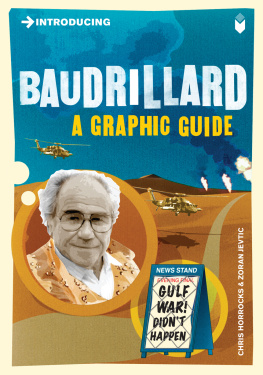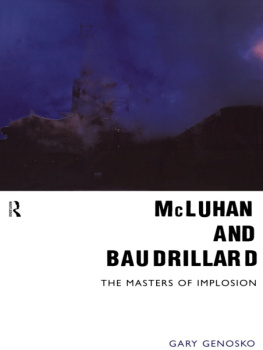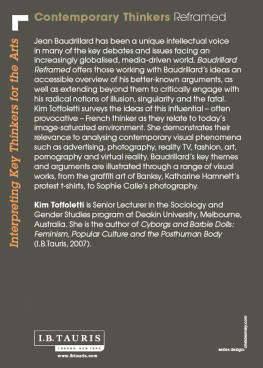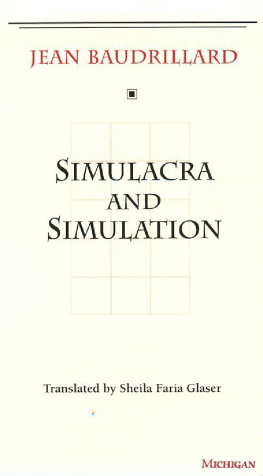Published by Icon Books Ltd, Omnibus Business Centre, 3941 North Road, London N7 9DP
Email:
www.introducingbooks.com
ISBN: 978-184831-984-4
Text copyright 2012 Icon Books Ltd
Illustrations copyright 2012 Icon Books Ltd
The author and illustrator has asserted their moral rights
Originating editor: Richard Appignanesi
No part of this book may be reproduced in any form, or by any means, without prior permission in writing from the publisher.
Contents
Jean Baudrillard Con? Icon? Iconoclast?
As the Marxist critic Douglas Kellner said,
The whole Baudrillard affair is rapidly mutating into a new idolatry of a new master thinker, and is in danger of giving rise to a new orthodoxy.
His theoretical position has radically altered over this time
Jean BaudriIlards enormous output on mass consumption, media and society stretches from the political turbulence of 1960s France to the global vertigo of the 1990s.
from early Marxist critiques of modern consumer culture and society, through a succession of skirmishes with psychoanalysis, sociology, semiology and Marxism itself, to his rejection of theory and its replacement with an extreme fatal vision of the world.
Baudrillard is a contradictory character. The real Baudrillard was elusive- almost secretive. In seminars he seemed passive and uncertain. Yet the virtual Baudrillard is ferociously uncompromising and his virulent style is met with equal force by critics who accuse him of intolerance, banality, generalization and facetiousness.
Its not just his style they find irksome.
Baudrillard disturbs the theoretical foundations of academia, and intellectuals are wary of his popularity with the media. Academia questions his status as a serious intellectual.
So who was Jean Baudrillard and what did he do to upset people?
I dont think of myself as a philosopher perhaps a moralist, but certainly not a sociologist.
Although he taught sociology up till the mid 1980s, its misleading to call him a sociologist much of his work is intent on destroying the discipline.
Its safe to call Baudrillard a critical theorist for his Marxist period and fatal theorist later on when his writing style sends theory beyond its limits.
Im an aeronautical missionary.
Fasten your seatbelts
Background Algeria, Existentialism, Marxism
I was born in Rheims, France in 1929, just after the first great crisis of modernity the Wall Street Crash.
His grandparents were peasants and his parents civil servants.
The young Jean studied hard at the Lyce, then taught German before taking up sociology. He went to university late, as an assistant at Nanterre, Paris. In 1966, he completed his thesis in sociology.
His interest in politics came with the lefts opposition to the Algerian War and his association with Existentialist Jean Paul Sartres (1905-80) journal Les Temps Modernes in 1962-63, for which he wrote literary reviews.
Modern society produces inauthentic relations between its members.
Only lived and experienced existence provides a philosophical platform to overcome this not appeals to human essences.
But did Baudrillard adopt my existentialist philosophy?
No, he sided with Henri Lefebvre, the Marxist sociologist.
Sartres novels are quite simply boring. His philosophy turns human anguish into a mystery overcome by a superhuman moment.
Thats inhuman. Anguish is everyday fear and misery. We must reverse this slide into contempt for man and not condemn his triviality.
Lefebvres Critique of Everyday Life (1958) examined social structures beyond the workplace but with an emphasis on Marxs concept of alienation.
Baudrillard did follow Sartres creation of the intellectual as independent from political parties, free to build a dialogue with Marxism.
Revolution in Everyday Life
Capitalism represses the free development and exercise of physical and mental faculties.
The assembly-line worker is reduced to a mere fragment of man. Inner potential appears in alienated forms. Money is the alienated essence of mans labour and life.
In the modern world, everyday life has ceased to be a subject rich in subjectivity; it has become an object of social organization.
We live in a bureaucratic society of controlled consumption.
Henri called for a revolution via everyday life. Even festivals would play a part.
Mass Consumption
In the 1960s, Baudrillard and his contemporaries saw a new France emerging: modernization, technological development, monopoly capitalism and a developing information society of mass consumption.
But could traditional Marxism account for or incorporate these upheavals? Was capitalism extending itself beyond the workplace or was this a radical departure?
Identify contradictions between classes in relations of production by economic analysis of the commodity?
No, Marxs theories of the mode of production have stalled. Consumption not production is the basis of the social order.
Baudrillards first major project was to provide a critical account for the emergence and effect of mass consumption.
Structuralism
But what methodology could he use?
Fashionable Structuralism a method which emphasizes deep permanent structures of languages and cultures, which contends that the subject is not derived from existence but from language.
I am against structuralism a system intent on classifying culture is repressive.




















